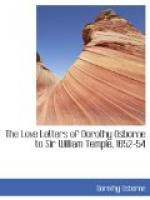I am sorry for poor Walker, but you need not doubt of what he has of yours in his hands, for it seems he does not use to do his work himself. I speak seriously, he keeps a Frenchman that sets all his seals and rings. If what you say of my Lady Leppington be of your own knowledge, I shall believe you, but otherwise I can assure you I have heard from people that pretend to know her very well, that her kindness to Compton was very moderate, and that she never liked him so well as when he died and gave her his estate. But they might be deceived, and ’tis not so strange as that you should imagine a coldness and an indifference in my letters when I so little meant it; but I am not displeased you should desire my kindness enough to apprehend the loss of it when it is safest. Only I would not have you apprehend it so far as to believe it possible,—that were an injury to all the assurances I have given you, and if you love me you cannot think me unworthy. I should think myself so, if I found you grew indifferent to me, that I have had so long and so particular a friendship for; but, sure, this is more than I need to say. You are enough in my heart to know all my thoughts, and if so, you know better than I can tell you how much I am
Yours.
Letter 19.—Lady Ruthin is Susan, daughter and heiress of Charles Longueville Lord Grey de Ruthin. She married Sir Harry Yelverton, a match of which Dorothy thoroughly approved. We hear more of Dorothy’s beautiful friend at the time when the treaty with Sir Harry Yelverton is going forward. Of Mr. Talbot I find nothing; we must rest contented in knowing him to be a fellow-servant.
R. Spencer is Robert Spencer, Earl of Sunderland, Lady Sunderland’s brother-in-law. He was afterwards one of the inner council of four in Temple’s Scheme of Government. “In him,” says Macaulay, in a somewhat highly-coloured character-sketch, “the political immortality of his age was personified in the most lively manner. Nature had given him a keen understanding, a restless and mischievous temper, a cold heart, and an abject spirit. His mind had undergone a training by which all his vices had been nursed up to the rankest maturity.”
Lady Lexington was Mary, daughter of Sir Anthony Leger; she was the third wife of Robert Sutton, Earl of Lexington. I cannot find that her daughter married one of the Spencers.
SIR,—If to know I wish you with me pleases you, ’tis a satisfaction you may always have, for I do it perpetually; but were it really in my power to make you happy, I could not miss being so myself, for I know nothing else I want towards it. You are admitted to all my entertainments; and ’twould be a pleasing surprise to me to see you amongst my shepherdesses. I meet some there sometimes that look very like gentlemen (for ’tis a road), and when they are in good humour they give us a compliment as they go by; but you would be so courteous as to stay, I hope, if we entreated you; ’tis in your




